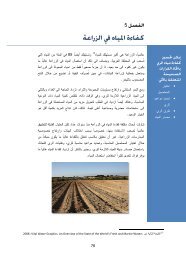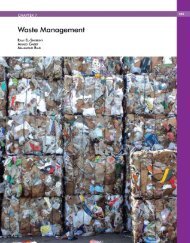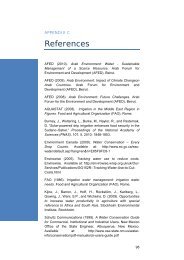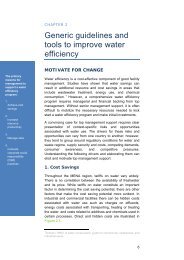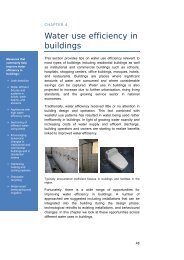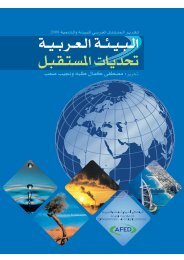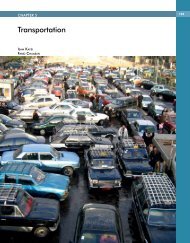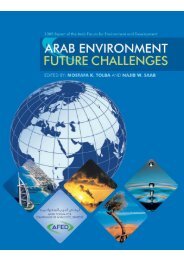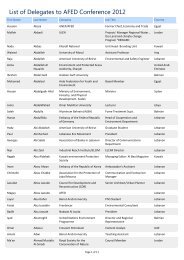Impact of Climate Change on Arab Countries - (IPCC) - Working ...
Impact of Climate Change on Arab Countries - (IPCC) - Working ...
Impact of Climate Change on Arab Countries - (IPCC) - Working ...
You also want an ePaper? Increase the reach of your titles
YUMPU automatically turns print PDFs into web optimized ePapers that Google loves.
142<br />
CHAPTER 11<br />
INTERNATIONAL NEGOTIATIONS FOR A POST-KYOTO REGIME<br />
<strong>on</strong> the key issues that have divided North and<br />
South negotiators so far, and scepticism that a<br />
comprehensive post-2012 treaty will be reached<br />
is growing. What is now clear is that developing<br />
countries will not accept commitments that<br />
imply significant restricti<strong>on</strong>s <strong>on</strong> their ec<strong>on</strong>omic<br />
growth. Such countries as China and India<br />
point with justifiable satisfacti<strong>on</strong> to the rapid<br />
growth they have achieved in the recent past and<br />
the rise in living standards that has resulted.<br />
They support their positi<strong>on</strong> by pointing to the<br />
large percentages <str<strong>on</strong>g>of</str<strong>on</strong>g> their populati<strong>on</strong>s still living<br />
in extreme poverty and their need for rapid<br />
expansi<strong>on</strong> in employment to absorb these<br />
labour surpluses. Developing countries believe<br />
that their ec<strong>on</strong>omic growth must be supported<br />
by increases in energy use, although accepting<br />
the possibility that energy use per unit <str<strong>on</strong>g>of</str<strong>on</strong>g> producti<strong>on</strong><br />
can c<strong>on</strong>tinue to decline, as it has d<strong>on</strong>e<br />
up to now.<br />
Therefore, despite pressure from developed<br />
countries, developing countries are highly unlikely<br />
to accept binding restricti<strong>on</strong>s or nati<strong>on</strong>al caps<br />
<strong>on</strong> greenhouse gas emissi<strong>on</strong>s comparable to those<br />
in the Kyoto Protocol for Annex I countries.<br />
Those will be seen as almost certain to restrict<br />
ec<strong>on</strong>omic growth, because the base <str<strong>on</strong>g>of</str<strong>on</strong>g> renewable<br />
energy generati<strong>on</strong> is small and both China and<br />
India are very dependent <strong>on</strong> coal for electric<br />
power generati<strong>on</strong>. In the event these countries<br />
should prove willing to accept future nati<strong>on</strong>al<br />
emissi<strong>on</strong> ceilings, they would insist that those<br />
caps would become binding <strong>on</strong>ly well into the<br />
future. In either case, a strategy that can lead to<br />
immediate acti<strong>on</strong> is sorely needed.<br />
At the same time, the Annex I countries will not<br />
accept that the world’s other major emitters c<strong>on</strong>tinue<br />
with ‘business as usual’ as the underlying<br />
principle. Not <strong>on</strong>ly would this risk substantial<br />
leakage <str<strong>on</strong>g>of</str<strong>on</strong>g> emissi<strong>on</strong>s to the developing world, it<br />
would also imply major financial transfers from<br />
North to South, whether under the Clean<br />
Development Mechanism, a global emissi<strong>on</strong><br />
trading system, or another cooperative arrangement.<br />
As the U.S. government made clear during<br />
the pre-Kyoto negotiati<strong>on</strong>s, it will not incur<br />
significant mitigati<strong>on</strong> costs unless the major<br />
developing countries agree to undertake significant<br />
acti<strong>on</strong>s as well. If the United States refuses<br />
to act, other industrialized countries will be limited<br />
in their commitments as well.<br />
REFERENCES<br />
Commissi<strong>on</strong> <strong>on</strong> <str<strong>on</strong>g>Climate</str<strong>on</strong>g> <str<strong>on</strong>g>Change</str<strong>on</strong>g> and Development -<br />
CCD (2009). Closing the Gaps. Internati<strong>on</strong>al Task<br />
Force On <str<strong>on</strong>g>Climate</str<strong>on</strong>g> <str<strong>on</strong>g>Change</str<strong>on</strong>g> and Development, May<br />
2009. At: www.ccdcommissi<strong>on</strong>.org<br />
Global Leadership for <str<strong>on</strong>g>Climate</str<strong>on</strong>g> Acti<strong>on</strong> - GLCA (2007).<br />
Framework for a Post-2012 Agreement <strong>on</strong> <str<strong>on</strong>g>Climate</str<strong>on</strong>g><br />
<str<strong>on</strong>g>Change</str<strong>on</strong>g>. September 2007. At http://www.globalclimateacti<strong>on</strong>.org<br />
Global Leadership for <str<strong>on</strong>g>Climate</str<strong>on</strong>g> Acti<strong>on</strong> - GLCA (2008).<br />
Framework for a Post-2012 Agreement <strong>on</strong> <str<strong>on</strong>g>Climate</str<strong>on</strong>g><br />
<str<strong>on</strong>g>Change</str<strong>on</strong>g> - 2008 Update. September 2007. At:<br />
http://www.globalclimateacti<strong>on</strong>.org<br />
Global Leadership for <str<strong>on</strong>g>Climate</str<strong>on</strong>g> Acti<strong>on</strong> - GLCA (2009).<br />
Facilitating an Internati<strong>on</strong>al Agreement <strong>on</strong> <str<strong>on</strong>g>Climate</str<strong>on</strong>g><br />
<str<strong>on</strong>g>Change</str<strong>on</strong>g>: Adaptati<strong>on</strong> to <str<strong>on</strong>g>Climate</str<strong>on</strong>g> <str<strong>on</strong>g>Change</str<strong>on</strong>g>. Global<br />
Leadership for <str<strong>on</strong>g>Climate</str<strong>on</strong>g> Acti<strong>on</strong>, June 2009.<br />
Institute for Public Policy Research (2009). Fairness in<br />
Global <str<strong>on</strong>g>Climate</str<strong>on</strong>g> <str<strong>on</strong>g>Change</str<strong>on</strong>g> Finance, March 2009.<br />
Intergovernmental Panel <strong>on</strong> <str<strong>on</strong>g>Climate</str<strong>on</strong>g> <str<strong>on</strong>g>Change</str<strong>on</strong>g> - <strong>IPCC</strong><br />
(2007). <str<strong>on</strong>g>Climate</str<strong>on</strong>g> <str<strong>on</strong>g>Change</str<strong>on</strong>g> 2007: <str<strong>on</strong>g>Impact</str<strong>on</strong>g>s, Adaptati<strong>on</strong><br />
and Vulnerability. C<strong>on</strong>tributi<strong>on</strong> <str<strong>on</strong>g>of</str<strong>on</strong>g> <strong>Working</strong> Group II to<br />
the Fourth Assessment Report <str<strong>on</strong>g>of</str<strong>on</strong>g> the<br />
Intergovernmental Panel <strong>on</strong> <str<strong>on</strong>g>Climate</str<strong>on</strong>g> <str<strong>on</strong>g>Change</str<strong>on</strong>g> [M.L.<br />
Parry, O.F. Canziani, J.P. Palutik<str<strong>on</strong>g>of</str<strong>on</strong>g>, P.J. van der<br />
Linden and C.E. Hans<strong>on</strong> (Eds.)], Cambridge University<br />
Press, Cambridge, United Kingdom and New York, NY,<br />
USA.<br />
Stern, Nicholas (2006). Stern Review <strong>on</strong> the<br />
Ec<strong>on</strong>omics <str<strong>on</strong>g>of</str<strong>on</strong>g> <str<strong>on</strong>g>Climate</str<strong>on</strong>g> <str<strong>on</strong>g>Change</str<strong>on</strong>g>. Report to the Prime<br />
Minister and the Chancellor <str<strong>on</strong>g>of</str<strong>on</strong>g> the Exchequer <strong>on</strong> the<br />
Ec<strong>on</strong>omics <str<strong>on</strong>g>of</str<strong>on</strong>g> <str<strong>on</strong>g>Climate</str<strong>on</strong>g> <str<strong>on</strong>g>Change</str<strong>on</strong>g>. UK.<br />
World Resources Institute - WRI (2008). From<br />
Positi<strong>on</strong>s to Agreement: Technology and Finance at<br />
the UNFCCC. December 2008.



